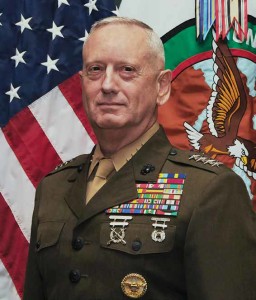Leadership Lessons
From Legendary Marine General James Mattis
by Allen Weiss, MD, MBA, FACP, FACR
President and CEO, NCH Healthcare System
Learning from others helps us improve personally and helps our communities and everyone within live longer, happier, and healthier lives.
A good friend shared an article entitled “17 Brilliant Insights from Legendary Marine General James Mattis,” which motivated and inspired me to examine how we as a community serve others.
General Mattis retired from the Marine Corps as the 11th Commander of the Central Command in Tampa, Florida, in 2013 after four decades of service. He has been compared to a modern-day Patton in terms of personality and charisma. He is admired not only by Marines and the other military branches, but also by business and government leaders across the nation.
Many of his quotes are so applicable to today’s rapidly changing times where we sometimes get mired in minutia.
“You cannot allow any of your people to avoid the brutal facts. If they start living in a dream world, it’s going to be bad.” How true, particularly as we as a nation look at the unsustainable healthcare costs coupled with the growing rates of obesity and inactivity. Obtaining accurate, timely, actionable data—and then transparently sharing with everyone involved—are steps which must be taken early on if we want to be successful. The old head in the sand approach doesn’t solve anything. (It just exposes the backside and postures for failure.)
“I don’t lose any sleep at night over the potential for failure. I cannot even spell the word.” Talk about optimism! General Mattis impressed on his troops that failure should not be an option.
What you think will happen, can happen, is a thought I have carried and shared with family, friends and colleagues. If you think you can, your chances for success increase exponentially.
Attitude matters and has a profound effect on those around you. We live in a wonderful community with great assets. Staying positive keeps us on a virtuous path with positive feedback.
“In this age, I don’t care how tactically or operationally brilliant you are, if you cannot create harmony on the battlefield based on trust across service lines, across coalition and national lines, and across civilian/military lines, you need to go home, because your leadership is obsolete. We have got to have officers who can create harmony across all those lines.” Yes, this has a military slant; but just think about collaboration and cooperation to accomplish any task or achieve any goal in any organization which has size or complexity. We need to have harmony.
Being able to get along with those around us is probably more important than having an outstanding skill and not being able to function within a team. Learning to play in the sandbox early in life is the characteristic we call “harmony” in adulthood. Come to think of it, being able to harmonize in families and get along across generations makes for a much richer and longer life. Over generations, families, tribes, and nations which harmonized flourished whereas those which were caught up in internecine warfare perished. Think how devastating the Civil War was for America and how well the three nations of North America—Canada, Mexico, and the United States—harmonize (most of the time), enabling all three to be more successful as commerce and culture cross borders.
“We need to come out from our reactive crouch and take a firm, strategic stance in defense of our values,” General Mattis stated in a Senate Armed Services Committee two years after he officially retired from the military. Well, we are not in the military but we do need to take firm stands on values directed to health. Keeping folks healthy, preventing illnesses, and avoiding problems has not been in the realm of the typical “repair shop” healthcare businesses which thrive on sickness. Locally we are taking a firm stance as we embrace the Blue Zones Project for the next decade which will increase our longevity. Individuals will team up, take the pledge, change habits, sustain gains, and objectively through a third party auditor document improvements from added years of life to lower healthcare needs/costs. Along with these positive changes our weight will come down, smoking rates will drop, and exercise patterns will improve across all of southwest Florida.
“You don’t take anything off the table up front.” Knowing what your resources are and having a pretty good idea of what other capabilities exist either in the environment or possessed by others is a huge advantage if you want to accomplish a significant goal. Although this might sound adversarial, in any enterprise—be it public health or cultural awareness or education—understanding who has what at any time during a project makes for a higher chance of success. Assessing the incidence of tobacco users, the number of children who have easy and frequent access to the public library system, or how best to stabilize a home environment are just top of mind examples of understanding your resources and your starting point.
“Ultimately, a real understanding of history means that we face nothing new under the sun.” This pithy statement parallels the thought that there is no original sin, it has all been done before. Understanding people’s motives, societies’ actions, and civilizations’ responses all help predict our future. Appreciating that everything goes though cycles with ups and downs helps frame our expectations. Overreacting one way or the other generally is not as productive as looking at the whole situation long-term with a balanced view. Understanding history helps us
with that long view.
General Mattis is an avid reader and on his deployments he brought along a small library. We don’t have to create all new ideas but rather learn best practices from others and use them in new ways. In one of the General’s emails on the importance of reading, he wrote that reading “doesn’t give me all the answers, but it lights what is often a dark path ahead.”
We all can and should learn from those around us. There are more parallels among disciplines than there are differences. Our esteemed military leaders have skills which have been honed in the most difficult life and death situations. Fortunately, most of us are not playing for such high stakes every day. Nonetheless, in healthcare, education, service and manufacturing industries we can and should all learn best practices from others.
General Mattis and all those who have served our nation should be admired for their sacrifices and leadership. Along with his leadership, his thoughtful observations have helped our nation immeasurably.



Leave a Reply
Want to join the discussion?Feel free to contribute!